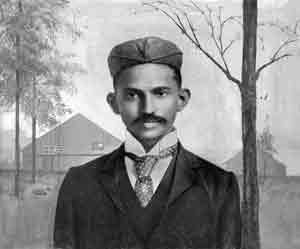On this day in 1893, the twentieth century’s most famous non-violent revolutionary, Mohandas Gandhi, committed his first act of civil disobedience when the then 24-year-old Indian lawyer was forcibly ejected from a train at South Africa’s Pietermaritzburg Railway Station. Refusing to move to a third-class carriage while holding a valid ticket for the whites-only first-class compartment, the great future leader was pushed off the train in the middle of the night, in the middle of winter, his luggage hastily thrown after him. The incident would change the course of his life – and that of millions of others. Gandhi later recalled:
I was afraid for my very life. I entered the dark waiting-room. There was a white man in the room. I was afraid of him. What was my duty? I asked myself. Should I go back to India, or should I go forward with God as my helper, and face whatever was in store for me? I decided to stay and suffer. My active non-violence began from that date.
It was in South Africa that Gandhi’s world-famous spiritual principles of satyagraha (“holding on to truth”, or “soul force”) and ahimsa (non-violence) were formed. Arriving in early 1893 to practice law under a one-year contract, Gandhi settled in the province of Natal, where Indian Muslims – mainly descendents of indentured servents – outnumbered the white European community, triggering racist legislation denying Indians the right to vote. Following his ejection from the train, Gandhi resolved to remain in South Africa to take up the struggle against these new laws. He formed the Natal Indian Congress, drawing international attention to the plight of South Africa’s Indian population. In 1906, he organised his first satyagraha, or mass civil disobedience, when the Transvaal government sought to further restrict the rights of Indians. After seven years of protest, he negotiated a compromise agreement.
For twenty-one years, Gandhi served his revolutionary apprenticeship in South Africa – one of the world’s most notoriously discriminatory and racist hot spots. When he returned to India in 1914, he was ready to fulfil his destiny as leader of his country’s independence movement.
The radical audacity of Gandhi’s theories and practices is often lost in the benign reverence his name evokes. And so, on the anniversary of the defining moment of his revolutionary life, let us pause to reconsider Mahatma Gandhi’s ingeniously effective vision:
I have nothing new to teach the world. Truth and non-violence are as old as the hills. All I have done is to try new experiments in both on as vast a scale as I could do… Those who believe in the simple truths I have laid down can propagate them only by living them.



4 Responses to 7th June 1893 – Gandhi’s First Act of Civil Disobedience